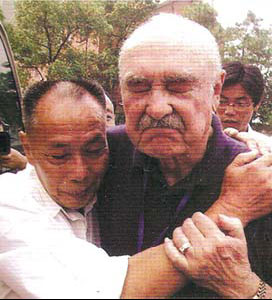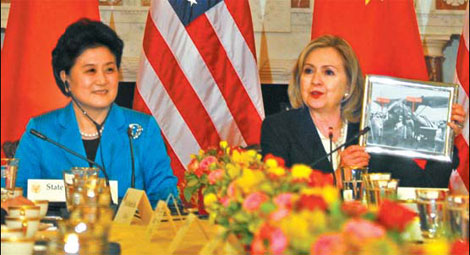Chinese: You're the true heroes
 |
|
Former "Flying Tiger" Glen Beneda on his last trip to China. Provided to China Daily |
 |
|
US Secretary of State Clinton shows a photo she received as a gift from State Councilor Liu Yandong. The photo shows Liu's father with rescued US pilots in the 1940s. Wen Xian / For China Daily |
A former US pilot's last overseas trip was to the Chinese village that rescued him in WWII, Larry Lee and Chunying Cai report.
Whenever he heard a United States president say: "May God bless America", the late Glen Beneda would add: "May God bless China and the Chinese people."
That is because the McCook, Nebraska, native was a former "Flying Tiger", part of a team of American fighter pilots who spent World War II helping the Chinese fight Japanese aggression. Beneda was saved by Chinese villagers when his plane was shot down 66 years ago.
On April 12, a documentary Touching the Tiger about Beneda and his rescue in 1944, premiered at the Chinese embassy in Washington. The film was produced by Li Xiaolin, vice-president of the Chinese People's Association for Friendship with Foreign Countries, and daughter of the late Chinese leader Li Xiannian (1909-1992). Li, who later became Chinese president, had arranged for Beneda to be escorted safely back to the former Flying Tigers' base in Chongqing.
Beneda never forgot. Last year at age 86, he took his last trip to China. He took along 10 family members because he wanted his children and grandchildren to continue the strong bond he had forged with the Chinese people. On Oct 23, 2010, four days after returning from China, Beneda died.
His widow, Elinor, and twin sons attended the premiere. In her speech, Elinor said of his long ago rescue: "He was a stranger, yet you cared for him; he was injured, and you attended to his wounds; he couldn't walk and you carried him; he was hungry and thirsty and you provided food for him; he was lonely and you gave him ping-pong playing friends. The greatest gift we received from the Chinese people is Glen's life which we shared for 65 years."
Following the Japanese attack on Pearl Harbor on Dec 7, 1941, 18-year-old Glen Beneda joined what was then the American Volunteer Group, founded to help China fight Japanese aggression. Led by General Claire Chennault, the fighter pilot team was known as the "Flying Tigers", and had a shark's face painted on the nose of their planes. The unit was later absorbed into the US 14th Air Force.
During a mission in May of 1944, the P-51 Mustang fighter flown by Beneda was shot down by Japanese aircraft over Hubei province. While his plane spiraled down into a nearby lake, Beneda managed to parachute into a rice field with injured legs. He was soon rescued by farmers in the fields of Luojia village, Jianli county.
The Japanese had occupied the region, and to hide a Flying Tiger meant risking the lives of all those in the village. A few months before, more than 1,000 in a nearby village had been executed by the Japanese after they discovered that some villagers had helped several American pilots. Despite the risk, the farmers in Jianli were determined to protect Beneda. They tied heavy stones to his plane to sink it in the lake. They hid Beneda in different places, attended to his wounds and fed him rice and eggs - the most precious food they had at the time.
The farmers also contacted nearby guerrilla soldiers, who later carried Beneda over mountains and rivers for some 800 km to a safe base, the 5th division headquarters of the New Fourth Army, where he was received by commander Li Xiannian. Li was a native of Hong'an county, also in Hubei province.
Before Beneda was escorted back safely to Chongqing, Li gave him a prize pistol which Beneda cherished all his life. Li also asked Beneda to deliver to Chennault a captured Japanese ceremonial sword which had belonged to a Japanese general. Beneda's return to the Flying Tigers base after missing for nearly 60 days was hailed as a miracle.
After his Air Force career, Beneda became a firefighter in Los Angeles. His loyalty and gratitude to the Chinese people never wavered.
His son Edward recalled: "My father had heart problems and had heart surgery. When he heard negative news about China, he would literally feel pain in his heart."
In 2002, when Beneda attended a symposium in Beijing for Chinese and American veterans who had fought the Japanese in World War II, a Chinese woman called on him at his hotel. She had learned of his story from newspapers. She was from Jianli county and her grandfather was among those who had saved his life.
When Beneda returned to China in 2005 to attend another symposium, he met Li Xiaolin, who was deeply drawn to his story and his connection with her father. She helped Beneda make a pilgrimage back to the village where he was rescued.
More than 1,000 villagers greeted him as a returning hero and held a celebration party in his honor. They made a special bamboo chair and carried him to the lake where his airplane sank. Beneda was overwhelmed to find that some of his rescuers of more than 60 years ago were among the welcoming crowd.
Beneda later learned that the locals in Jianli were excavating the crash site and were planning to repair his aircraft and display it in a memorial hall near the site.
"I often dreamt about my former fighter being brought back - I still cannot believe that my dream will soon come true," Beneda wrote in a letter to the China Cultural Links Project Organization, which was overseeing the project.
When Li Xiaolin sent Beneda an invitation to the opening of the Li Xiannian Memorial Museum in October 2010, Beneda jumped at the chance. He embarked on his third and final trip to China despite the fact that his heart was failing.
The prize pistol that Li gave Beneda six decades ago is now displayed in the museum.
At the premiere, Elinor Beneda was presented the People's Friendship Ambassador Medal by State Councilor Liu Yandong. Liu, who was in Washington meeting with Secretary of State Hillary Clinton, is the daughter of late senior Party official Liu Ruilong (1910-1988). Liu lost three soldiers when rescuing a Flying Tigers pilot during the war and his daughter presented a historical photo to Clinton of her father and the American pilot he rescued.
Very few Flying Tigers or their rescuers are still alive.
Elinor still prepares coffee for her late husband every morning. Old soldiers never die, she believes, nor will their legacies. Elinor said that Beneda often said: "There is absolutely no way I can ever repay the Chinese."
Glen Beneda must have smiled when he heard his grandson's words during the trip, which was captured in the documentary. "The people of China called my grandfather a hero because they came to fight on behalf of China, but my grandfather called Chinese people heroes because they helped him to escape. I can see the same spirit exists in their sons and grandsons, and I want them (Chinese people) to know that the same spirit also exists in my grandfather's sons, his grandsons, and even my children."






















